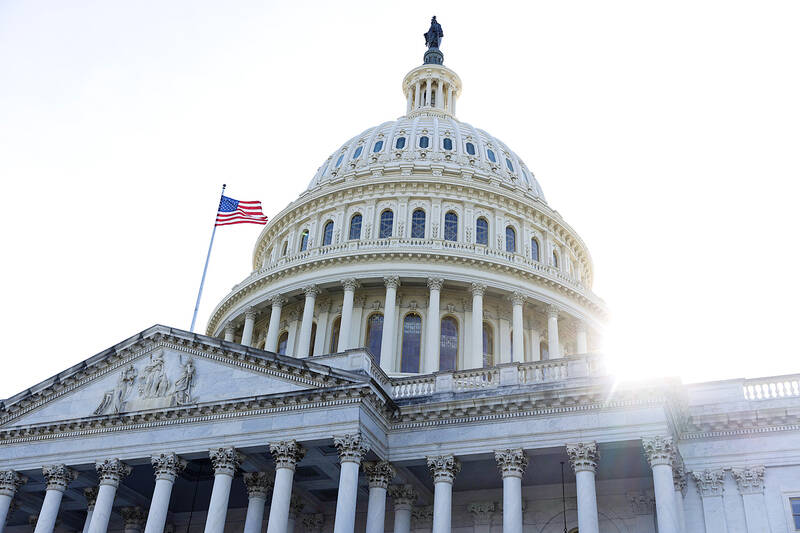US lawmakers on Thursday introduced new legislation to strengthen Taiwan-US defense cooperation to counter Beijing’s aggression.
US senators Jacky Rosen and Dan Sullivan, along with US representatives Michelle Steel and Steven Horsford, introduced the bipartisan and bicameral bill, transpacific allies investing in weapons to advance national (TAIWAN) security act, calling for stronger Taiwan-US defense cooperation “to counter China’s growing military expansion in the region,” Rosen’s office said in a statement.
The bill requires the US Secretary of Defense “to enhance defense industrial base cooperation” between Washington and Taipei to “deepen US-Taiwan defense ties, promote supply chain security and help alleviate Taiwan’s readiness challenges,” it said.

Photo: EPA-EFE
Under the bill, the US Department of Defense should submit a report to the US Congress on the feasibility and advisability of signing a defense industry cooperation agreement with Taiwan within 180 days of the act taking effect, Voice of America reported yesterday.
The bill requires the Pentagon to deliberate on several factors, including whether Taiwan is eligible to receive funds from the US department to join defense cooperation projects, and whether Taiwan is eligible to enter into a memorandum or other formal agreements with the US, it said.
In the face of Beijing’s rapid military buildup and aggression toward Taiwan, Rosen called on the US to “not only ensure our strength, but also bolster the strength of our democratic ally, Taiwan,” it said.
“It is no secret that communist China’s evil dictator, [Chinese President] Xi Jinping (習近平), is planning to invade Taiwan and continue his attacks against democracy in a quest for world domination,” said US Senator Rick Scott, who joined Rosen in introducing the bill.
The US should support its “peaceful and democratic ally Taiwan and its military” as the action would “send a strong message to communist China that America stands strong with Taiwan and will not bow to the will of an evil communist regime,” he added.
Other sponsors of the bill, including US senators Tim Kaine, Tammy Duckworth and Joni Ernst, described Taiwan as the US’ important partner in the Indo-Pacific region.
Horsford said that the bill, which is modeled on the cooperation between the US and India, “will bolster the Indo-Pacific’s stability in the face of growing military challenges from China.”
The US must show its “steadfast commitment to our allies, including Taiwan” to deter China’s expansion and protect democracy, Steel said.
The bill is to be reviewed and passed by the committees of both chambers, and if passed would be sent to the US Senate and the US House of Representatives to be voted on.
A day before the bill was introduced, vice president-elect Hsiao Bi-khim (蕭美琴) called for Taiwan’s inclusion in the US defense supply chain at the Hill and Valley Forum in Washington.
Rosen was one of the US lawmakers who introduced the Taiwan Cybersecurity Resiliency Act last year to authorize the US department to conduct cybersecurity exercises with Taiwan, and defend the nation’s military networks and infrastructure.
The act was incorporated into the National Defense Authorization Act for Fiscal Year 2024 and signed into law.

INVESTIGATION: The case is the latest instance of a DPP figure being implicated in an espionage network accused of allegedly leaking information to Chinese intelligence Democratic Progressive Party (DPP) member Ho Jen-chieh (何仁傑) was detained and held incommunicado yesterday on suspicion of spying for China during his tenure as assistant to then-minister of foreign affairs Joseph Wu (吳釗燮). The Taipei District Prosecutors’ Office said Ho was implicated during its investigation into alleged spying activities by former Presidential Office consultant Wu Shang-yu (吳尚雨). Prosecutors said there is reason to believe Ho breached the National Security Act (國家安全法) by leaking classified Ministry of Foreign Affairs information to Chinese intelligence. Following interrogation, prosecutors petitioned the Taipei District Court to detain Ho, citing concerns over potential collusion or tampering of evidence. The

‘FORM OF PROTEST’: The German Institute Taipei said it was ‘shocked’ to see Nazi symbolism used in connection with political aims as it condemned the incident Sung Chien-liang (宋建樑), who led efforts to recall Democratic Progressive Party (DPP) Legislator Lee Kun-cheng (李坤城), was released on bail of NT$80,000 yesterday amid an outcry over a Nazi armband he wore to questioning the night before. Sung arrived at the New Taipei City District Prosecutors’ Office for questioning in a recall petition forgery case on Tuesday night wearing a red armband bearing a swastika, carrying a copy of Adolf Hitler’s Mein Kampf and giving a Nazi salute. Sung left the building at 1:15am without the armband and apparently covering the book with a coat. This is a serious international scandal and Chinese

Seventy percent of middle and elementary schools now conduct English classes entirely in English, the Ministry of Education said, as it encourages schools nationwide to adopt this practice Minister of Education (MOE) Cheng Ying-yao (鄭英耀) is scheduled to present a report on the government’s bilingual education policy to the Legislative Yuan’s Education and Culture Committee today. The report would outline strategies aimed at expanding access to education, reducing regional disparities and improving talent cultivation. Implementation of bilingual education policies has varied across local governments, occasionally drawing public criticism. For example, some schools have required teachers of non-English subjects to pass English proficiency

TRADE: The premier pledged safeguards on ‘Made in Taiwan’ labeling, anti-dumping measures and stricter export controls to strengthen its position in trade talks Products labeled “made in Taiwan” must be genuinely made in Taiwan, Premier Cho Jung-tai (卓榮泰) said yesterday, vowing to enforce strict safeguards against “origin laundering” and initiate anti-dumping investigations to prevent China dumping its products in Taiwan. Cho made the remarks in a discussion session with representatives from industries in Kaohsiung. In response to the US government’s recent announcement of “reciprocal” tariffs on its trading partners, President William Lai (賴清德) and Cho last week began a series of consultations with industry leaders nationwide to gather feedback and address concerns. Taiwanese and US officials held a videoconference on Friday evening to discuss the